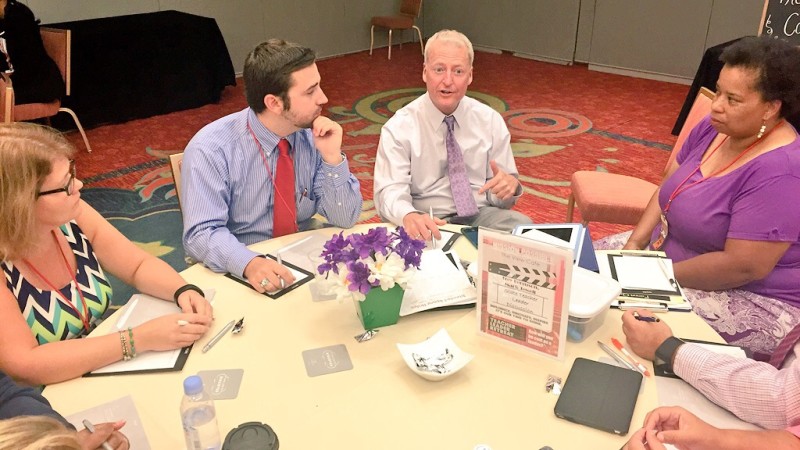“Teachers demonstrate leadership”
As North Carolina teachers, we hang on these three-words. What does it mean to be a teacher-leader? Educators are challenged to balance our instructional responsibilities to our students while seeking classroom, school, and professional opportunities to “check off this standard” in our annual evaluation. The N.C. Professional Teaching Standards on our teacher evaluation, the mystery of teacher leadership breaks down into three areas.

Teachers lead in their classrooms
Our data-driven school culture demands student achievement test scores, personal education plans and documented value-added scores all to demonstrate teacher effectiveness as it pertains to student learning. So the evaluation of school leadership must rightly begin with the students—in the classroom.
Classroom leadership is effectively taking ownership of the learning happening in your room, and constantly improving on it. Learning a new strategy or tool to implement and boost student achievement exemplifies this type of leadership. For lower-performing students, high quality, up-to-date instruction is a necessity to closing the achievement gap. Finding the time and opportunity for our professional growth is challenging, so the problem is juggling the paperwork with application of this practice.
Guilford County’s Mission Possible program identifies and grows teacher leaders at their low-performing schools by providing specialist support and professional development to increase their effectiveness. To foster classroom leadership, schools and districts can create these types of professional learning opportunities, and free up teachers for leadership training, thus influencing students’ classroom learning and leadership at the school level.
Teachers demonstrate leadership in the school
School leadership is a dynamic philosophy. Its shift from the traditional concept of top-down management to teacher-led leadership is changing the ways professional learning occurs. Increasing interest in coaching opportunities gives novice educators experienced classroom support, professional collaboration, and reflection. However, increased workloads and the lack of financial incentives, mentor participation is rapidly declining.
GCS’s Mission Possible program promotes teacher empowerment to at the school-level, providing teacher leader support to classrooms around the school in the form of peer mentoring, instructional coaching, and professional growth. By sharing their expert skills exhibited in classroom leadership in collaborative conferences with their colleagues, teachers are increasing their own effectiveness as leaders and supporting the colleagues around them.
Teachers lead the teaching profession
For many aspects of our career including compensation, working conditions, and curriculum changes, teachers must also be advocates. This type of leadership goes beyond the school-level and evokes a higher level of public-scrutiny many of my colleagues find terrifying. Nevertheless, the need is stronger than ever before.
As a member of the Hope Street Group’s N.C. Teacher Voice Network, I — and my network of fellows — are tasked with engaging perspective teacher leaders on crafting district and state level professional learning networks to collect constructive, data-supported feedback to propel positive change in N.C. education. This experience facilitates opportunities for my colleagues and myself to work in the policy-realm of education leaders in our profession.
As educators, we are innate leaders. Our daily classroom lessons lead our students’ learning, and we must continue seeking leadership in professional growth and mentoring, sharing our experiences, and ultimately driving change. NC New Schools / Breakthrough Learning’s network of educators can aid in promoting their leadership capacity by sharing their stories in their districts and across the state. By modeling their teacher leadership roles within the classroom, school, and profession, they highlight the successes and challenges of teacher leadership, and its ultimate impact to public education in our state.
Trey Ferguson is a 2015-2016 Hope Street Group North Carolina Teacher Voice Fellow. He is a math teacher at Leesville Road High School in Raleigh, the co-adviser for the Executive Student Council and the school’s 2014-2015 Beginning Teacher of the Year. Ferguson collaborated with the Public School Forum of North Carolina to create the Beginning Teacher Network of Wake County, a professional development and advocacy program devoted to spark active engagement with public education policy among BTs. Ferguson worked with the N.C. DPI team at the U.S. Dept. of Education’s States Teach to Lead summit in Washington, D.C. and periodically blogs for EdNC.org. He is an N.C. Teaching Fellow and graduate of N.C. State University.




















